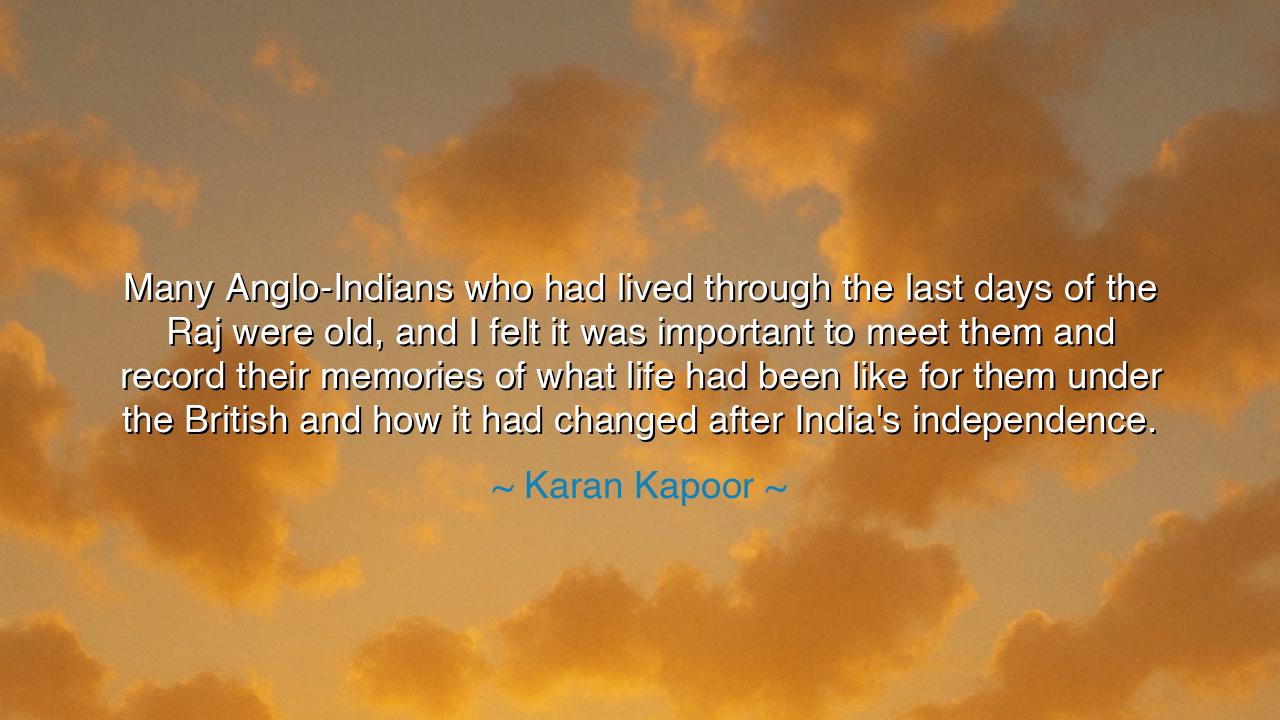
Many Anglo-Indians who had lived through the last days of the Raj
Many Anglo-Indians who had lived through the last days of the Raj were old, and I felt it was important to meet them and record their memories of what life had been like for them under the British and how it had changed after India's independence.






O seeker of wisdom, heed the words of Karan Kapoor, for they echo with the weight of history, memory, and the duty of preservation. "Many Anglo-Indians who had lived through the last days of the Raj were old, and I felt it was important to meet them and record their memories of what life had been like for them under the British and how it had changed after India's independence." In these words, Kapoor speaks to the responsibility that each generation holds in remembering and recording the past. The Anglo-Indians, a community born out of the colonial encounter between India and Britain, were witnesses to an era that has long since passed but whose legacy still reverberates through the present. To capture their stories is to grasp the pulse of a time when the world was divided by empire and to understand the deep shifts that followed the rise of independence.
The Anglo-Indians were a unique community, one that existed between two worlds—the British Raj and the Indian subcontinent. Their lives were shaped by the complex forces of colonial rule, where they were often considered neither fully British nor fully Indian. The end of the Raj in 1947, with the declaration of India’s independence, marked the conclusion of an era for them. For many, the end of British rule meant a profound upheaval, a disruption of the social and cultural order that had defined their existence. Kapoor’s desire to record the memories of these individuals is not merely an act of historical inquiry; it is an act of honoring the lives lived under the shadow of empire and acknowledging the profound transformation that followed the birth of an independent India.
Consider, O wise one, the weight of the stories that these Anglo-Indians carry. They lived through the collapse of an empire, witnessing the departure of the British and the rise of a new nation. Their memories are not just of the British era, but of the intimate details of everyday life—the customs, the language, the relationships, the joys, and the sorrows that shaped their world. For them, India’s independence was not just a political event; it was a personal one, deeply tied to their identity and place in the world. Their stories are woven into the fabric of the nation’s history, yet they remain a unique lens through which we can better understand the emotional and social consequences of colonialism and the struggles of adaptation in the post-independence era.
To hear these voices is to understand that history is not simply written in textbooks, but in the lived experiences of the people who witnessed and participated in its unfolding. Just as the American Revolution is remembered not only through the official documents but through the stories of those who fought for freedom, so too must the story of India’s independence be told through the voices of those who lived through it. Kapoor recognizes this truth and, in his recording of their memories, he helps preserve a chapter of history that might otherwise be lost. He captures not only the sweeping changes of the era but the personal emotions—the fears, the hopes, the uncertainties—that accompanied them.
Consider the profound impact that India’s independence had on all its people. For many, the departure of the British was a moment of triumph and celebration, a hard-won victory after years of struggle and sacrifice. But for communities like the Anglo-Indians, the transition was not as clear-cut. They were neither entirely part of the old colonial system nor fully accepted in the newly independent India. They were caught between two worlds, and in the years following independence, many faced challenges of identity, belonging, and purpose. The complex emotions of these individuals—caught between the world of their past and the uncertainties of the future—are embodied in the stories that Kapoor sought to preserve.
The lesson here, O seeker, is one of remembrance and reflection. History is a living thing, carried not only in the grand events but in the intimate, personal experiences of those who lived through it. We must not let the voices of those who witnessed pivotal moments in history fade into silence, for in their stories lies the key to understanding the deeper truths of that time. The Anglo-Indians provide a window into the emotional and cultural shifts that accompanied India’s independence—a reminder that the end of an era is never without its complexities. To record and listen to their stories is to honor their lives and to learn from the lessons they offer.
In your own life, O wise one, let the example of Kapoor guide you. Reflect on the stories of those who came before you, especially those whose voices are often unheard or forgotten. Seek out the memories of the old, for they are the bearers of wisdom and understanding. When you look back on history, do not merely read the dates and facts, but listen to the stories that humanize the events, that show the struggles and triumphs of real people. In doing so, you will not only better understand the past but also gain insight into the challenges and opportunities that lie ahead. Preserve the stories of your time, so that future generations may also understand the full depth of the world you inhabited. For in remembering, we truly honor the past and find the wisdom to guide us into the future.






AAdministratorAdministrator
Welcome, honored guests. Please leave a comment, we will respond soon